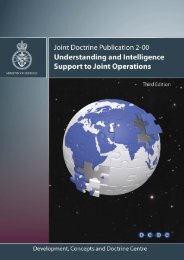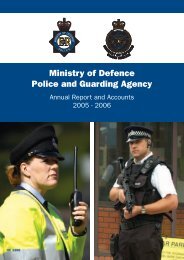MDPGA Framework Document 2010-2013 PDF - Ministry of Defence
MDPGA Framework Document 2010-2013 PDF - Ministry of Defence
MDPGA Framework Document 2010-2013 PDF - Ministry of Defence
You also want an ePaper? Increase the reach of your titles
YUMPU automatically turns print PDFs into web optimized ePapers that Google loves.
MINISTRY OF DEFENCE POLICE<br />
AND GUARDING AGENCY<br />
<strong>Framework</strong> <strong>Document</strong><br />
<strong>2010</strong> - <strong>2013</strong><br />
1
Foreword<br />
By Susan Scholefield, Director General Human Resources &<br />
Corporate Services, Owner <strong>of</strong> the <strong>Ministry</strong> <strong>of</strong> <strong>Defence</strong> Police<br />
and Guarding Agency.<br />
The <strong>Ministry</strong> <strong>of</strong> <strong>Defence</strong> Police (MDP) became a <strong>Defence</strong> Agency in 1996. On<br />
1 st April 2004 the Agency expanded to include the <strong>Ministry</strong> <strong>of</strong> <strong>Defence</strong> Guard<br />
Service (MGS) under the direction <strong>of</strong> the Chief Constable as Chief Executive.<br />
The Agency has since been known as the <strong>Ministry</strong> <strong>of</strong> <strong>Defence</strong> Police &<br />
Guarding Agency (<strong>MDPGA</strong>).<br />
The Agency provides a comprehensive policing and guarding service to the<br />
<strong>Ministry</strong> <strong>of</strong> <strong>Defence</strong>, as well as others in the UK and abroad.<br />
The MDP provide armed guarding to nuclear and other key national sites as<br />
well as policing services across defence.<br />
The MGS provide civilian unarmed guarding services at over 200 defence sites.<br />
The performance <strong>of</strong> the Agency, their key outputs to our defence and other<br />
customers will be overseen by the Owner’s Advisory Board. Police activity will<br />
be overseen by the independent Police Committee.<br />
This document outlines the framework that the Agency will operate under for<br />
the next three years.<br />
This will be a difficult time <strong>of</strong> considerable change and adjustment. Costs will<br />
need to be reduced across defence and Agency customers are likely to want<br />
less and expect more from the Agency.<br />
I know that the Chief Executive, his MDP and MGS <strong>of</strong>ficers and other civilian<br />
staff will successfully respond to those challenges. I wish them well.<br />
Susan Scholefield<br />
2
Contents<br />
Foreword 2<br />
Contents 3<br />
Section 1 – Status, Roles and Accountability 5<br />
Page Paragraph<br />
Status 5 1.1<br />
Role <strong>of</strong> the Secretary <strong>of</strong> State/Minister 5 1.3<br />
Role <strong>of</strong> the Agency Owner 5 1.5<br />
Role <strong>of</strong> the Chief Executive 6 1.7<br />
Independence and Constitutional Position <strong>of</strong> the 7 1.8<br />
Chief Constable<br />
Appointment <strong>of</strong> the Chief Executive 7 1.10<br />
Accountability to Parliament 7 1.11<br />
Accounting Officers 8 1.13<br />
Relationship with Central Departments 8 1.14<br />
Parliamentary Commissioner for Administration 8 1.15<br />
Freedom <strong>of</strong> Information 8 1.16<br />
Section 2 – Agency Business 9<br />
Role 9 2.1<br />
Strategic Vision 9 2.2<br />
Standards 9 2.3<br />
Agency Outputs 9 2.4<br />
Customers and Stakeholders 10 2.5<br />
Section 3 – Agency Organisation 11<br />
Management Organisation 11 3.1<br />
Location 11 3.2<br />
Staff 12 3.6<br />
Section 4 – Planning, Tasking and Resourcing 13<br />
Planning 13 4.1<br />
Risk Management 13 4.4<br />
Tasking 13 4.5<br />
Resourcing 14 4.7<br />
Services provided to the Agency by the MOD 14 4.10<br />
Section 5 – Performance Evaluation 15<br />
Priorities 15 5.1<br />
Performance Indicators 15 5.2<br />
3
Section 6 – Reports, Accounts and Audit 16<br />
Page Paragraph<br />
Reporting and Accounting 16 6.1<br />
Internal Audit 16 6.2<br />
External Audit 16 6.3<br />
Section 7 – Human Resources, Pay and Training 17<br />
Status and Conditions <strong>of</strong> Employment 17 7.1<br />
HR Management 17 7.4<br />
Pay 18 7.10<br />
Training 18 7.12<br />
Conduct & Discipline 18 7.13<br />
Health and Safety 19 7.14<br />
Employee Relations 19 7.15<br />
Diversity and Equal Opportunities 19 7.17<br />
Section 8 – Review <strong>of</strong> <strong>Framework</strong> <strong>Document</strong> 20<br />
Review 20 8.1<br />
Amendment 20 8.2<br />
Publication 20 8.3<br />
Annexes:<br />
A <strong>MDPGA</strong> Governance<br />
B <strong>MDPGA</strong> Management Organisation<br />
C Services provided to the Agency by MOD<br />
4
Section 1<br />
Status, Roles and Accountability<br />
Status<br />
1.1 The <strong>Ministry</strong> <strong>of</strong> <strong>Defence</strong> Police & Guarding Agency (<strong>MDPGA</strong>) is an<br />
Agency <strong>of</strong> the <strong>Ministry</strong> <strong>of</strong> <strong>Defence</strong> (MOD) that sits within the Director General<br />
Human Resources & Corporate Services (DG HR&CS) Higher Level Budget<br />
(HLB). The Agency was initially formed in 1996 as the <strong>Ministry</strong> <strong>of</strong> <strong>Defence</strong><br />
Police (MDP) Agency and expanded in April 2004 to become the <strong>MDPGA</strong> when<br />
it was joined by the <strong>Ministry</strong> <strong>of</strong> <strong>Defence</strong> Guard Service (MGS).<br />
1.2 The requirement for civil policing within the MOD is laid out in the<br />
“<strong>Ministry</strong> <strong>of</strong> <strong>Defence</strong> Police – Statement <strong>of</strong> Requirement” document that was<br />
issued to the Chief Constable in September 2008 following agreement by the<br />
Chief Operating Officers and the Agency Owner.<br />
Role <strong>of</strong> the Secretary <strong>of</strong> State/Minister<br />
1.3 The Secretary <strong>of</strong> State for <strong>Defence</strong> has ultimate responsibility for<br />
determining the policy, financial framework and delegations <strong>of</strong> authority within<br />
which the Agency operates. In practice, the Secretary <strong>of</strong> State for <strong>Defence</strong><br />
delegates day-to-day responsibility for the Agency to the DG HR&CS as Owner<br />
<strong>of</strong> the Agency.<br />
1.4 As the MDP is a statutory Police Force within the Department, the<br />
Secretary <strong>of</strong> State for <strong>Defence</strong> has additional responsibilities under law.<br />
Section 1(5) <strong>of</strong> The <strong>Ministry</strong> <strong>of</strong> <strong>Defence</strong> Police Act 1987, as amended by the<br />
Anti-Terrorism, Crime & Security Act 2001, provides that the Secretary <strong>of</strong> State<br />
for <strong>Defence</strong> shall appoint a Committee, to be known as the <strong>Ministry</strong> <strong>of</strong> <strong>Defence</strong><br />
Police Committee. The <strong>Ministry</strong> <strong>of</strong> <strong>Defence</strong> Police Committee is chaired by an<br />
Independent Chair, as appointed by the Secretary <strong>of</strong> State for <strong>Defence</strong> and<br />
details <strong>of</strong> its composition and terms <strong>of</strong> reference may be found within Annex<br />
A2.<br />
Role <strong>of</strong> the Agency Owner – The Director General Human<br />
Resources & Corporate Services<br />
1.5 The Agency Owner’s responsibilities are:<br />
• To determine and agree the strategic aims and objectives <strong>of</strong> the Agency<br />
and to set and monitor the performance <strong>of</strong> the Agency against key<br />
financial and performance priorities. The Owner should also be<br />
consulted on the Agency’s corporate and business plans.<br />
• To advise Ministers on the strategic direction <strong>of</strong> the Agency in the<br />
context <strong>of</strong> wider departmental or cross-governmental objectives and on<br />
their response to strategic performance management.<br />
• To keep the Chief Executive informed <strong>of</strong> any central policy<br />
developments relevant to the Agency.<br />
5
• To monitor the high level performance <strong>of</strong> the Agency and to provide<br />
appropriate challenges and support to ensure that the Agency is able to<br />
deliver its outputs to its objectives and Priorities.<br />
• To approve the annual budget <strong>of</strong> the Agency, and to ensure that the<br />
Agency has the delegations and authorities necessary for effective<br />
delivery and continuous improvement.<br />
• To assist the Chief Executive to work through the implications <strong>of</strong> any<br />
recommendations emerging from any Departmental reviews where they<br />
affect the Agency.<br />
• To appoint the individual who will have the joint role <strong>of</strong> Agency Chief<br />
Executive and Chief Constable <strong>of</strong> the <strong>Ministry</strong> <strong>of</strong> <strong>Defence</strong> Police (see<br />
paragraph 1.10 below) following appropriate selection/approval<br />
procedures and approval by the Secretary <strong>of</strong> State.<br />
1.6 DG HR&CS, as Agency Owner, chairs and is advised as appropriate by<br />
an Agency Owners Advisory Board (OAB), whose composition and terms <strong>of</strong><br />
reference may be found at Annex A1.<br />
Role <strong>of</strong> the Agency Chief Executive<br />
1.7 The Chief Executive is accountable to the Agency Owner and the<br />
Secretary <strong>of</strong> State for the Agency’s performance. The Chief Executive has key<br />
responsibilities involved in the day-to-day management <strong>of</strong> the Agency. These<br />
include:<br />
• To be the Chief Constable <strong>of</strong> the MDP (see paragraph 1.8 below).<br />
• Responsibility to lead, direct and manage the Agency, delivering aims,<br />
objectives and priorities for the Agency as formally determined by the<br />
Owner.<br />
• Ensuring the efficient delivery <strong>of</strong> customer requirements within the cost,<br />
quality and timeframe defined in Joint Business Agreements (JBAs).<br />
• Contributing towards the strategic direction <strong>of</strong> the Agency, including the<br />
development <strong>of</strong> the corporate and business plans.<br />
• Implementing the Agency’s approved corporate and business plans,<br />
including the achievement <strong>of</strong> priorities and performance levels, within<br />
budget and agreed timescales.<br />
• Ensuring the corporate governance arrangements are consistent with<br />
departmental policy, including in relation to corporately identified risk.<br />
• Ensuring that effective procedures for handling complaints from within<br />
and outside the Agency are established and publicised and ensuring that<br />
all complaints receive appropriate attention as required.<br />
• Managing the Agency, its assets and resources in an efficient and<br />
effective manner.<br />
• Ensuring that Investment Proposals are taken forward in accordance<br />
with Investment Approval Board-owned procedures.<br />
• Reporting issues concerning the Agency to the Agency Owner, 2 nd PUS<br />
(as Policing Champion in the MOD), the <strong>Ministry</strong> <strong>of</strong> <strong>Defence</strong> Police<br />
Committee and <strong>Defence</strong> Ministers as appropriate.<br />
• Ensuring that the requirements <strong>of</strong> Government Accounting as set out in<br />
‘Managing Public Money’ are met, and that the Agency observes the<br />
Resource Accounting policy and guidance contained in Joint Services<br />
Publication (JSP) 472.<br />
6
• Implementing recommendations accepted by Government from the<br />
Public Accounts Committee, Parliamentary Select Committees, or other<br />
Parliamentary authorities.<br />
• Meeting UK, European and International legal requirements that are<br />
relevant to the Agency’s business.<br />
Independence and Constitutional Position <strong>of</strong> the Chief<br />
Constable<br />
1.8 The MDP Act 1987, as amended by the Anti-terrorism, Crime and<br />
Security Act 2001 defines at Section 1(3) that the “Secretary <strong>of</strong> State shall<br />
appoint a Chief Constable for the <strong>Ministry</strong> <strong>of</strong> <strong>Defence</strong> Police and the latter shall<br />
operate under the Chief Constable’s direction and control”. The Chief<br />
Constable is obliged under statute and other procedures and processes to<br />
ensure that <strong>of</strong>fences reported to <strong>of</strong>ficers <strong>of</strong> the Force are investigated. It is fully<br />
acknowledged and accepted that the Secretary <strong>of</strong> State for <strong>Defence</strong>, the DG<br />
HR&CS and the Agency OAB have key roles to perform in setting priorities and<br />
in providing constructive advice and strategic guidance to the Chief Constable<br />
in relation to Business Planning, including the setting <strong>of</strong> Agency Priorities, and<br />
the financial management <strong>of</strong> the <strong>MDPGA</strong>. However, the Chief Constable alone<br />
has ultimate responsibility and exclusive statutory authority for the pr<strong>of</strong>essional<br />
direction and control <strong>of</strong> the sworn constables <strong>of</strong> the MDP and for determining<br />
the investigation <strong>of</strong> crime within the Chief Constable’s jurisdiction.<br />
1.9 In the exercise <strong>of</strong> this responsibility, the Chief Constable is answerable<br />
to the law alone. The MDP is independent from political or Departmental<br />
influence in the maintenance and operation <strong>of</strong> the law. It is the role <strong>of</strong> the MOD<br />
Police Committee to provide independent scrutiny and assurance to the<br />
Secretary <strong>of</strong> State <strong>of</strong> the exercise <strong>of</strong> constabulary authority by the Chief<br />
Constable. The MDP’s police operations are subject to statutory provisions<br />
relating to police activities and also come within the jurisdiction <strong>of</strong> the<br />
Independent Police Complaints Commission (IPCC). The Chief Constable has<br />
direct access to the Secretary <strong>of</strong> State for <strong>Defence</strong> to whom he is ultimately<br />
responsible.<br />
Appointment <strong>of</strong> the Agency Chief Executive<br />
1.10 The Chief Executive is selected and appointed through open competition<br />
by the Secretary <strong>of</strong> State for <strong>Defence</strong>. The Chief Executive is appointed on a<br />
fixed term contract and is eligible to be considered annually for a nonconsolidated,<br />
non-pensionable performance related bonus. The Chief Executive<br />
is directly accountable for the performance <strong>of</strong> the Agency and as such, the<br />
appointment can be terminated on the grounds <strong>of</strong> poor performance.<br />
Accountability to Parliament<br />
1.11 Notwithstanding the operational independence <strong>of</strong> the Chief Constable, the<br />
Secretary <strong>of</strong> State for <strong>Defence</strong> is accountable to Parliament for all matters<br />
concerning the Agency, although <strong>Defence</strong> Ministers will not normally be<br />
involved in the day-to-day management <strong>of</strong> the Agency. The Secretary <strong>of</strong> State<br />
is responsible for deciding which <strong>of</strong>ficial should represent him/her at<br />
Parliamentary Committees and will normally ask the Chief Executive to<br />
represent him/her when the Agency’s affairs are being discussed.<br />
7
1.12 Ministers will decide the appropriate way to respond to written<br />
Parliamentary Questions (PQs) about the Agency. They will normally ask the<br />
Chief Executive to respond to written PQs on their behalf. Responses will be<br />
published in Hansard, which is the edited verbatim report <strong>of</strong> proceedings in<br />
both Houses <strong>of</strong> Parliament. The Chief Executive will provide Ministers with the<br />
information needed to respond to all Parliamentary business concerning the<br />
Agency, keeping DG HR&CS informed during the process.<br />
Accounting Officers<br />
1.13 The Permanent Secretary (PUS), as the Departmental Principal<br />
Accounting Officer, retains overall responsibility for the organisation,<br />
management and staffing <strong>of</strong> the Department and for ensuring that there is a<br />
high standard <strong>of</strong> financial management in the Department as a whole. The<br />
Agency Chief Executive, as analogous Agency Accounting Officer, is<br />
accountable to PUS for the financial management <strong>of</strong> the Agency. The Chief<br />
Executive has:<br />
• Accountability to the Departmental Accounting Officer for ensuring the<br />
propriety and regularity <strong>of</strong> the Agency’s expenditure, the adequacy <strong>of</strong> its<br />
financial systems, the prudent and economical administration <strong>of</strong> the<br />
Agency, and the efficient and effective use <strong>of</strong> the Agency’s allocated<br />
resources.<br />
• Responsibility, if required, to accompany the Departmental Accounting<br />
Officer to the Public Accounts Committee to account for the discharge <strong>of</strong><br />
his/her responsibilities.<br />
Relationship with Central Departments<br />
1.14 The Chief Executive is required to keep the Agency Owner, MOD Policy<br />
branches and the Director (Strategy & Resources) informed when making direct<br />
contact with HM Treasury and the Cabinet Office. Likewise the Department is<br />
required to keep the Chief Executive informed when dealing with Central<br />
Departments on matters concerning the Agency.<br />
Parliamentary Commissioner for Administration<br />
1.15 The Agency is subject to the jurisdiction <strong>of</strong> the Parliamentary<br />
Commissioner for Administration. PUS is the Principal Accounting Officer <strong>of</strong><br />
the Department for this purpose, but may delegate the responsibility for replying<br />
on any matter concerning the Agency to the Chief Executive; a decision made<br />
on a case-by-case basis.<br />
Freedom <strong>of</strong> Information<br />
1.16 The Chief Executive will fully comply with the Freedom <strong>of</strong> Information<br />
Act.<br />
8
Section 2<br />
Agency Business<br />
Role<br />
2.1 The role <strong>of</strong> the Agency is delivering effective Policing and Guarding as a<br />
part <strong>of</strong> the UK’s <strong>Defence</strong> capability.<br />
Strategic Vision<br />
2.2 The strategic vision <strong>of</strong> the <strong>MDPGA</strong> is as follows:<br />
In support <strong>of</strong> the UK’s defence to deliver, by use <strong>of</strong> Constabulary<br />
powers, high quality defensive armed and specialist capability<br />
policing; and unarmed guarding.<br />
Our Standards<br />
2.3 The Agency incorporates the following Standards in all aspects <strong>of</strong> its<br />
business:<br />
• Operational Match Fitness – A flexible and responsive organisation<br />
where all personnel understand, are properly equipped, for their role.<br />
• Crime – Being clear that our focus is crime that harms the defence<br />
capability and co-operating with partners whenever required.<br />
• “Two Badges, One Service – 100% co-operation and communication<br />
between the MDP and MGS in all areas <strong>of</strong> business.<br />
• Customer Focus – Maintaining good customer relations and meeting our<br />
customers’ needs.<br />
• Leadership – Effective leadership and management throughout the<br />
organisation.<br />
• Conduct – The Agency will not tolerate such things as: Dishonesty,<br />
Actions or Neglect which endanger colleagues or <strong>Defence</strong> security,<br />
Sexual or other forms <strong>of</strong> harassment at work, Racist language or<br />
behaviour, or any form <strong>of</strong> humiliation <strong>of</strong> one person by another.<br />
Agency Outputs<br />
2.4 The main crime and security risks which the <strong>Ministry</strong> <strong>of</strong> <strong>Defence</strong> and<br />
Armed Forces face, are:<br />
• Terrorist attack and the threat <strong>of</strong> such attacks<br />
• Disruption and disorder caused by protestors<br />
• Theft <strong>of</strong>, and damage to, key assets and material<br />
• Major financial fraud and corruption<br />
• Unauthorised intrusion onto <strong>Defence</strong> Estate<br />
9
The Agency will combat these crime and security risks through the Agency’s 8<br />
key outputs:<br />
• Protection: <strong>of</strong> the Strategic Nuclear Deterrent<br />
• <strong>Defence</strong> Business Continuity: the ability to reinforce the protection <strong>of</strong><br />
<strong>Defence</strong> personnel and property.<br />
• Defensive Armed Policing: the capability to deter and to respond to an<br />
armed attack on our customers assets.<br />
• Uniformed Policing: the effective use <strong>of</strong> police powers to deter, detect<br />
and respond to crime and disorder.<br />
• Guarding: the provision <strong>of</strong> unarmed guarding and access control to<br />
<strong>Defence</strong> personnel and property.<br />
• Crime Investigation: the prevention, detection and investigation <strong>of</strong><br />
crime that impacts significantly against <strong>Defence</strong> capability and recovery<br />
<strong>of</strong> stolen assets.<br />
• International Capability: the contribution <strong>of</strong> specialist Policing and<br />
Guarding expertise in support <strong>of</strong> wider <strong>Defence</strong> and foreign policy<br />
objectives.<br />
• Policy: contributing to <strong>Defence</strong> policing and guarding policy.<br />
Agency Customers & Stakeholders<br />
2.5 As at April <strong>2010</strong>, the primary customers for <strong>MDPGA</strong> services are the Top<br />
Level Budget organisations that make-up the MOD:<br />
• <strong>Defence</strong> Equipment & Support<br />
• Land Forces<br />
• Air Command<br />
• Fleet<br />
• Central<br />
• <strong>Defence</strong> Estates<br />
• Permanent Joint Headquarters<br />
In addition to the above, the Agency provides services to: The Royal Mint; AWE<br />
Management Ltd; the Foreign and Commonwealth Office; the Meteorological<br />
Office; the <strong>Defence</strong> Support Group; the <strong>Defence</strong> Science & Technology<br />
Laboratory; the UK Hydrographic Office; the Crown (in respect <strong>of</strong> its property)<br />
and United States Visiting Forces.<br />
2.6 The primary Agency customers are represented at the Agency Owner’s<br />
Advisory Board (details at Annex A1), which enables customer views to<br />
contribute to the strategic direction <strong>of</strong> the Agency.<br />
10
Section 3<br />
Agency Organisation<br />
Management Organisation<br />
3.1 The Chief Executive is assisted by a senior management team known as<br />
the Agency Management Board, which consists <strong>of</strong> the senior managers within<br />
the Agency. The Agency Management Board (AMB) discusses the business <strong>of</strong><br />
the Agency through regular AMB meetings and the terms <strong>of</strong> reference for the<br />
Board are shown at Annex A3. The <strong>MDPGA</strong> AMB structure at April 2009 is as<br />
follows:<br />
Chair:<br />
Chief Constable/Chief Executive<br />
Members:<br />
Deputy Chief Constable<br />
Agency Secretary (Senior Civil Servant)<br />
Assistant Chief Constable – Pr<strong>of</strong>essional Development<br />
Assistant Chief Constable – Operational Support<br />
Assistant Chief Constable – Divisional Operations<br />
Head <strong>of</strong> Unarmed Guarding – (Senior Civil Servant)<br />
MGS Head <strong>of</strong> Pr<strong>of</strong>ession – (Civilian Band B1)<br />
Location<br />
3.2 The <strong>MDPGA</strong> Headquarters and Agency Training College is co-located at<br />
Wethersfield, Essex and is divided into six portfolios, each <strong>of</strong> which is headed<br />
by the senior staff shown above.<br />
3.3 The majority <strong>of</strong> the MDP are deployed at <strong>Defence</strong> establishments and<br />
installations in the UK and are organised into five Divisions each headed by a<br />
Chief Superintendent. The MDP Divisions are: Scotland (HQ based at HMNB<br />
Clyde); North Eastern (HQ based at York); South East (HQ based at<br />
Aldershot); Western (HQ based at Bath) and AWE, covering the Atomic<br />
Weapons Establishments at Aldermaston and Burghfield.<br />
3.4 The MGS is also deployed at <strong>Defence</strong> establishments and installations<br />
around the UK and is organised into five Regions each headed by a Regional<br />
Manager at civilian Band C1 level. The MGS Regions are: Region 1 – Scotland<br />
(HQ based at HMNB Clyde); Region 2 – Northern England, the Borders, the<br />
East Midlands & East Anglia (HQ based at York); Region 3 – Wales & the West<br />
Midlands (HQ based at Shrewsbury; Region 4 – London & the South East (HQ<br />
based at Aldershot) and Region 5 – the South West (HQ based at Bath). Charts<br />
detailing the MDP Divisions and MGS Regions are shown at Annex B1 and B2<br />
respectively.<br />
3.5 The Agency holds some assets, which consist <strong>of</strong> a small amount <strong>of</strong> land<br />
and buildings at <strong>MDPGA</strong> HQ, some plant, machinery, vehicles, weapons,<br />
information technology and communications equipment.<br />
11
Staff<br />
3.6 The Agency had as at April <strong>2010</strong> a staff <strong>of</strong> around 7,600, comprising<br />
some 3,500 MDP posts, 3,700 MGS posts and 400 civilian staff posts.<br />
12
Section 4<br />
Planning, Tasking, and Resourcing<br />
Planning<br />
4.1 The Chief Executive will prepare and agree with the Agency Owner, a<br />
Corporate Plan that covers the MOD Planning Round period, which will be<br />
updated and rolled forward annually. The MOD will assist the Agency in its<br />
corporate planning process by providing information about likely policy<br />
developments at Departmental level and other changes that could impact on<br />
the Agency. The Corporate Plan will include:<br />
• The Agency’s strategic vision, role, outputs, and standards<br />
• The Agency’s Governance structure<br />
• A summary <strong>of</strong> financial issues<br />
• Priorities for Financial Year 1 <strong>of</strong> the Corporate Plan period<br />
4.2 The Chief Executive will also prepare an annual Agency Business Plan,<br />
covering a one financial-year period, which will be linked to the Agency<br />
Corporate Plan and will define the shorter term objectives <strong>of</strong> the Agency in<br />
order to achieve the Agency’s Priorities and other key Agency projects and<br />
initiatives.<br />
4.3 The Corporate Plan and Business Plan will be published as a combined<br />
document and made available to interested parties. Additionally, the Corporate<br />
Plan and Business Plan will be published on the Agency’s pages on the MOD<br />
internet site. Once endorsed, these Plans will provide the strategic framework<br />
under which the Agency will deliver its key outputs.<br />
Risk Management<br />
4.4 The Agency operates risk management processes at all levels. The<br />
risks associated with delivering the outputs described in the Agency’s<br />
Corporate and Business Plans are assessed and categorised according to their<br />
likelihood <strong>of</strong> occurrence and the impact on the organisation should the risk<br />
materialise. An Agency Corporate Risk Register linked to the Agency Business<br />
Plan is maintained and updated on a regular basis, with all risks having a<br />
designated owner at Agency Management Board level who is accountable for<br />
the regular review, management and control <strong>of</strong> that risk. The Agency Audit<br />
Committee (see Section 6.4) supports and advises the Chief Executive on<br />
issues <strong>of</strong> risk control.<br />
Tasking<br />
4.5 The Agency will have a comprehensive suite <strong>of</strong> Joint Business<br />
Agreements (JBAs) with its customers. These documents articulate the level <strong>of</strong><br />
service the Agency will provide to it’s customers against agreed tasking levels,<br />
which the Agency Owner may agree or prioritise as appropriate.<br />
13
4.6 The Agency JBAs exist in two formats; an overarching agreement<br />
covering the corporate and financial supply <strong>of</strong> policing and security key outputs,<br />
and local agreements covering operational tasking at establishment level.<br />
Resourcing<br />
4.7 The Agency is a vote funded body and operates as a Management<br />
Group within the DG HR&CS Higher Level Budget (HLB), which is part <strong>of</strong> the<br />
MOD Central Top Level Budget organisation. The Chief Executive manages<br />
the Agency budget in accordance with MOD financial policy and procedures,<br />
and the delegations detailed in the Letter <strong>of</strong> Delegation that is issued by DG<br />
HR&CS. The online version <strong>of</strong> this <strong>Framework</strong> <strong>Document</strong> has a link to the<br />
Chief Executive’s current Letter <strong>of</strong> Delegation.<br />
4.8 Financial provision for the Agency is made from a delegation to the Chief<br />
Executive from DG HR&CS. The Chief Executive has authority to approve<br />
expenditure up to the limits prescribed in the Letter <strong>of</strong> Delegation issued by DG<br />
HR&CS.<br />
4.9 Support at local level will continue to be funded under current<br />
arrangements by host establishments. The costs <strong>of</strong> support will be reflected in<br />
the Agency’s accounts and included in local JBAs.<br />
Services provided to the Agency by the MOD<br />
4.10 It should be noted that services not specifically delegated to the Agency<br />
will continue to be provided by the MOD and that the costs <strong>of</strong> these services<br />
will be identified and included in the Agency annual accounts. Services<br />
provided to the Agency by MOD are detailed in Annex C.<br />
4.11 The Chief Executive has freedom to go elsewhere to obtain goods and<br />
services if better value for money can be secured. The exception to this is<br />
where the Chief Executive is limited by the delegations approved for the<br />
Agency or where the proposed course <strong>of</strong> action does not represent value for<br />
money for the defence budget overall. In cases <strong>of</strong> doubt, it should be noted<br />
that the Chief Executive should seek agreement <strong>of</strong> the Agency Owner that the<br />
proposed course <strong>of</strong> action represents value for money for the <strong>Defence</strong> budget<br />
overall.<br />
14
Section 5<br />
Performance Evaluation<br />
Agency Priorities<br />
5.1 Performance against the Agency’s published Priorities will be reported<br />
on a quarterly basis to the Agency Owner. The Agency Priorities are agreed<br />
annually following discussion at the Agency Owners Advisory Board, <strong>Ministry</strong> <strong>of</strong><br />
<strong>Defence</strong> Police Committee and Agency Audit Committee and define critical<br />
areas <strong>of</strong> performance against the Agency’s key outputs. The Priorities are listed<br />
in the Agency Corporate Plan, which also includes a summary <strong>of</strong> the<br />
performance achieved against the Priorities agreed for the previous year. The<br />
Agency Priorities will be announced each year by means <strong>of</strong> a written ministerial<br />
statement and will relate to:<br />
a. The delivery <strong>of</strong> agreed outputs to cost, time and quality.<br />
b. The efficient use <strong>of</strong> resources.<br />
Agency Performance Indicators<br />
5.2 The Agency utilises the Balanced Scorecard format <strong>of</strong> Business Plan,<br />
which contains set objectives, priorities and performance indicators for the<br />
Agency to achieve. Customer satisfaction with the performance <strong>of</strong> the Agency<br />
is measured through responses to annual MDP and MGS customer satisfaction<br />
surveys.<br />
15
Section 6<br />
Reports, Accounts and Audit<br />
Reporting and Accounting<br />
6.1 The Chief Executive will publish an Annual Report and Accounts,<br />
prepared in accordance with the accounting policy and format set out by<br />
Cabinet Office, HM Treasury and MOD guidance and will agree the contents <strong>of</strong><br />
the Accounts direction and the timetable for the accounts. The Chief Executive<br />
will ensure that the Annual Report and Accounts are laid before Parliament,<br />
normally prior to the summer recess. The Annual Report will include an<br />
Operations Report setting out the operational activities <strong>of</strong> the <strong>MDPGA</strong>.<br />
Internal Audit<br />
6.2 The Agency is subject to internal audit by staff from <strong>Defence</strong> Internal<br />
Audit (DIA) acting on behalf <strong>of</strong> the Principle Accounting Officer. The Chief<br />
Executive will be consulted in determining the programme <strong>of</strong> audit work and is<br />
responsible for implementing agreed audit recommendations in consultation<br />
with the Agency’s Audit Committee, the Terms <strong>of</strong> Reference <strong>of</strong> which is detailed<br />
at Annex A4. The Agency Audit Committee supports and advises the Chief<br />
Executive on issues <strong>of</strong> risk control and governance and reviews the<br />
comprehensiveness <strong>of</strong> the assurance measures in place within the Agency and<br />
reviews the reliability and integrity <strong>of</strong> these measures.<br />
External Audit<br />
6.3 In addition to internal audit, the Agency is subject to external audit by<br />
staff <strong>of</strong> the National Audit Office (NAO) acting on behalf <strong>of</strong> the Comptroller and<br />
Auditor General. Formal certification <strong>of</strong> the Agency’s accounts is required in<br />
accordance with Resource Accounting policy guidance contained in JSP 472.<br />
In addition, Her Majesty’s Inspector <strong>of</strong> Constabulary (HMIC) inspects the MDP,<br />
and the MGS are audited by the National Security Inspectorate. (NSI). HMIC<br />
reports are submitted to the <strong>Ministry</strong> <strong>of</strong> <strong>Defence</strong> Police Committee and are<br />
placed in the libraries <strong>of</strong> the Houses <strong>of</strong> Parliament.<br />
6.4 A major role <strong>of</strong> the MOD Police Committee is to provide independent<br />
scrutiny and assurance to the Secretary <strong>of</strong> State in regard to the exercise <strong>of</strong><br />
constabulary authority by the MDP. This is reported to the Secretary <strong>of</strong> State<br />
through the MOD Police Committee’s Annual Report.<br />
16
Section 7<br />
Human Resources, Pay and Training<br />
Status and Conditions <strong>of</strong> Employment<br />
7.1 The permanent staff <strong>of</strong> the Agency consists <strong>of</strong> MDP <strong>of</strong>ficers, MGS<br />
<strong>of</strong>ficers and non-uniformed civilian staff, all <strong>of</strong> whom are members <strong>of</strong> the Civil<br />
Service and subject to Civil Service terms and conditions <strong>of</strong> service. However,<br />
the conditions <strong>of</strong> employment <strong>of</strong> MDP <strong>of</strong>ficers in respect <strong>of</strong> pay, discipline,<br />
probation, some allowances and conditions <strong>of</strong> service are also aligned to Home<br />
Department Police regulations. The Chief Executive may introduce changes to<br />
Civil Service and MDP terms and conditions <strong>of</strong> service after securing (where<br />
appropriate) clearances from within the MOD and the Cabinet Office, and after<br />
appropriate consultation with the <strong>Defence</strong> Police Federation (DPF) and the<br />
Chief Police Officers’ Association (CPOA) in respect <strong>of</strong> MDP <strong>of</strong>ficers and with<br />
the recognised trade unions representing MGS and non-uniformed staff.<br />
7.2 Additional support may be engaged, where appropriate, from the private<br />
sector, under casual or temporary arrangements, on contract or consultancy<br />
terms, although any such arrangement should be consistent with current<br />
Departmental guidelines.<br />
7.3 The Chief Executive will manage staff resources to maximise value for<br />
money by structuring the Agency through a cost-effective mix <strong>of</strong> MDP <strong>of</strong>ficers,<br />
MGS <strong>of</strong>ficers and non-uniformed civilian staff commensurate with delivering the<br />
Agency’s key outputs and responsibilities.<br />
Human Resource Management<br />
In respect <strong>of</strong> MDP <strong>of</strong>ficers:<br />
7.4 The MDP are an analogue grade within the MOD and as such the Chief<br />
Executive/Chief Constable has the authority to manage MDP <strong>of</strong>ficers in<br />
accordance with the appropriate Civil Service, Departmental and Police<br />
regulations and with relevant UK employment legislation. This includes police<br />
recruitment, performance management and career development. Full details<br />
are set out in MOD Policy, Rules and Guidance documents.<br />
7.5 The Chief Executive/Chief Constable has the authority to create and<br />
abolish MDP posts, re-grade existing MDP posts and/or change the rank/grade<br />
mix in respect <strong>of</strong> all MDP posts up to and including the rank <strong>of</strong> Assistant Chief<br />
Constable – subject to remaining within resource control totals and within<br />
delegated complementing limits.<br />
In respect <strong>of</strong> Civilian staff (including MGS <strong>of</strong>ficers):<br />
7.6 The Chief Executive has the authority to manage all civilian staff working<br />
for the Agency in accordance with all relevant Civil Service and Departmental<br />
regulations and UK employment legislation. This includes staff recruitment and<br />
selection, performance management and career development. Full details are<br />
set out in MOD policy, rules and guidance documents.<br />
17
7.7 The Chief Executive has the authority to create and abolish civilian, regrade<br />
existing posts and/or change the rank/grade mix in respect <strong>of</strong> civilian<br />
posts within the Agency up to and including Pay Band B – subject to remaining<br />
within resource control totals and within delegated complementing limits.<br />
General points:<br />
7.8 The Chief Executive will secure comprehensive HR support for the<br />
Agency from the People Pay and Pensions Agency (PPPA) who will deliver<br />
transactional HR services that are not provided from within the Agency.<br />
7.9 Further details on the Chief Executive’s delegated authority in respect <strong>of</strong><br />
Staff Management issues are contained in the Letter <strong>of</strong> Delegation issued by<br />
DG HR&CS.<br />
Pay<br />
7.10 The Chief Executive has the authority to review and determine MDP pay<br />
scales and the allowances that are payable to MDP <strong>of</strong>ficers up to and including<br />
ACC rank (in consultation with the <strong>Defence</strong> Police Federation and the Chief<br />
Police Officers Association), taking due note <strong>of</strong> relative arrangements and<br />
agreements that are set by the Police Negotiating Board. MDP pay will be<br />
calculated at the agreed figure <strong>of</strong> 95% <strong>of</strong> the pay scales that apply to Home<br />
Department Police Forces. The salaries for the Chief Constable and Deputy<br />
Chief Constable will be subject to central arrangements.<br />
7.11 For civilian staff (including MGS <strong>of</strong>ficers) the Chief Executive will operate<br />
a pay and grading system that is in accordance with the MOD broader banded<br />
structure within Civil Service guidelines. In line with the status and conditions<br />
<strong>of</strong> employment paragraph above, the Chief Executive is free to propose pay<br />
and staffing schemes as part <strong>of</strong> wider plans to improve the efficiency and<br />
effectiveness <strong>of</strong> the Agency.<br />
Training<br />
7.12 The <strong>MDPGA</strong> is committed to encouraging and assisting personal<br />
development so that all Agency staff are given the opportunity to realise their<br />
full potential. The Chief Executive has the authority to identify, prioritise and<br />
meet the training needs <strong>of</strong> all Agency staff based on legislative and business<br />
needs. This will include meeting all statutory and mandatory training<br />
requirements.<br />
Conduct & Discipline<br />
7.13 In respect <strong>of</strong> MDP <strong>of</strong>ficers, the Chief Executive is responsible for<br />
ensuring that all disciplinary and restoring efficiency cases are handled in<br />
accordance with the appropriate the MDP (Conduct) Regulations and the<br />
relevant HR Policies as set out in MOD Policy, Rules and Guidance<br />
documents. For MGS <strong>of</strong>ficers and non-uniformed civilian staff, all disciplinary<br />
and restoring efficiency cases will be handled in accordance with MOD HR<br />
Policies as set out in MOD Policy, Rules and Guidance.<br />
18
Health & Safety<br />
7.14 The Chief Executive will ensure that all relevant management<br />
responsibilities for Safety, Health and Environment (SHE) are undertaken<br />
across the Agency through regular monitoring <strong>of</strong> all operational activities,<br />
accommodation standards and the working environment to maintain a safe<br />
place <strong>of</strong> work for all staff. This will ensure the continued development <strong>of</strong> best<br />
practice and safe working procedures across the Agency, and that regular<br />
consultation takes place between Agency personnel in order to raise and<br />
discuss SHE matters as appropriate. The Chief Executive will ensure that the<br />
Agency’s working environment complies fully with the legislative requirements<br />
for Safety, Health Environment (SHE) regulations.<br />
Employee Relations<br />
7.15 The Chief Executive is responsible for promoting good employee<br />
relations within the Agency and will consult with the following on all appropriate<br />
matters:<br />
• The DPF in respect <strong>of</strong> MDP Federated Ranks and the CPOA for MDP<br />
Chief Officers.<br />
• Those recognised Trade Unions that represent MGS and non-uniformed<br />
civilian staff.<br />
In addition, the Chief Executive may consult Agency staff through surveys and<br />
other means.<br />
7.16 The Agency is committed to the MOD policy on Employee Relations and<br />
will continue to maintain and support the MDP Joint Consultative Committee,<br />
the MGS Joint Consultative Committee and the Agency Whitley Committee in<br />
order to enhance employee relations across the Agency.<br />
Diversity and Equal Opportunities<br />
7.17 The Chief Executive is committed to, and will actively encourage and<br />
promote, Equality and Diversity to ensure both are mainstreamed into the<br />
Agency’s business by being incorporated into policies and processes at all<br />
levels and at all stages. The Chief Executive will provide staff with a working<br />
environment free from discrimination and harassment. With regard to the<br />
management <strong>of</strong> Agency personnel and the delivery <strong>of</strong> services (whether carried<br />
out by Agency personnel or any subcontractors), the Chief Executive will also<br />
take due account <strong>of</strong> all current and future statutory legislation and<br />
requirements. This commitment is reflected in the MOD and MDP Equality &<br />
Diversity Schemes and extends to any future statutory duties requiring equality<br />
schemes covering other diversity strands.<br />
19
Section 8<br />
Review <strong>of</strong> the <strong>Framework</strong> <strong>Document</strong><br />
Review<br />
8.1 The <strong>Framework</strong> <strong>Document</strong> will be reviewed every three years and<br />
following any major review <strong>of</strong> the Agency, in consultation with the Trade<br />
Unions, the DPF and the CPOA.<br />
Amendment<br />
8.2 The DG HR&CS, on behalf <strong>of</strong> the Secretary <strong>of</strong> State for <strong>Defence</strong>, or the<br />
Chief Executive may at any time propose amendments to this <strong>Framework</strong><br />
<strong>Document</strong>, in the light <strong>of</strong> any new experience, or to take account <strong>of</strong> any altered<br />
circumstances.<br />
.<br />
Publication<br />
8.3 An up to date copy <strong>of</strong> this <strong>Framework</strong> <strong>Document</strong> will be published on the<br />
Agency Intranet Website, the MOD website (http://www.mod.uk) and will be<br />
placed in the Libraries <strong>of</strong> both Houses <strong>of</strong> Parliament. Additional copies can be<br />
obtained from the Chief Executive, <strong>Ministry</strong> <strong>of</strong> <strong>Defence</strong> Police & Guarding<br />
Agency, Wethersfield, Braintree, Essex, CM7 4AZ.<br />
20
<strong>MDPGA</strong> Governance Annex A1<br />
Membership<br />
Chair and Owner<br />
<strong>MDPGA</strong> Owner’s Advisory Board<br />
Membership and Terms <strong>of</strong> Reference<br />
Director General Human Resources & Corporate Services<br />
Members<br />
Director Business Resilience<br />
Independent Chair <strong>of</strong> <strong>Ministry</strong> <strong>of</strong> <strong>Defence</strong> Police Committee<br />
Centre TLB Representative<br />
Fleet TLB Representative<br />
Land Forces TLB Representative<br />
Air Command TLB Representative<br />
DE&S TLB Representative<br />
<strong>Defence</strong> Estates TLB Representative<br />
In Attendance<br />
CE <strong>MDPGA</strong><br />
Chair <strong>of</strong> <strong>MDPGA</strong> Audit Committee<br />
Other customer groups (including repayment representatives) as invited<br />
Secretariat<br />
Def Sy – Policing Policy<br />
Terms <strong>of</strong> Reference<br />
1. To determine the overall priorities <strong>of</strong> the Agency;<br />
2. To approve the Corporate and Business Plans, which CE/<strong>MDPGA</strong> will<br />
submit in draft;<br />
3. To set Agency Key Targets, which CE/<strong>MDPGA</strong> will propose;<br />
4. To determine the arrangements for performance monitoring;<br />
5. To support, guide and advise the CE in the administration <strong>of</strong> the Agency<br />
(excluding day-to-day management) and to determine the resources required<br />
by the Agency and its budget;
6. To review the performance <strong>of</strong> the Agency against its Key Targets;<br />
7. To consider and review Customer Supply Agreements (CSAs) and monitor<br />
the <strong>MDPGA</strong>’s performance against the CSAs;<br />
8. To resolve any conflicts <strong>of</strong> priorities for the Agency’s services/outputs<br />
among relevant customer groups;<br />
9. To review the Agency <strong>Framework</strong> <strong>Document</strong> as required.
<strong>MDPGA</strong> Governance ANNEX A2<br />
<strong>Ministry</strong> <strong>of</strong> <strong>Defence</strong> Police Committee<br />
Membership<br />
Chair:<br />
Independent external appointee<br />
Membership and Terms <strong>of</strong> Reference<br />
Members:<br />
Police Advisor – England & Wales<br />
Police Advisor – Scotland<br />
3 x Independent Members<br />
Director General Human Resources & Corporate Services and Agency<br />
Owner (MOD)<br />
Director Business Resilience (MOD)<br />
In Attendance:<br />
2nd Permanent Under Secretary (MOD)<br />
Chief Constable MDP<br />
Members <strong>of</strong> the <strong>MDPGA</strong> Management Board and subject matter experts<br />
as required<br />
Chair <strong>of</strong> the MDP Chief Police Officers’ Association<br />
Chair <strong>of</strong> the <strong>Defence</strong> Police Federation<br />
Secretariat – Clerk to the Police Committee (Def Sy – Physical Security and<br />
Policing Policy)<br />
Terms <strong>of</strong> Reference<br />
The MOD Police Committee’s main role is to provide an independent scrutiny<br />
and assurance to the Secretary <strong>of</strong> State for <strong>Defence</strong> that the <strong>Ministry</strong> <strong>of</strong><br />
<strong>Defence</strong> Police (MDP) is delivering policing services in accordance with the<br />
MDP Act 1987.<br />
In order to perform this role the Committee is required to:<br />
1. Provide scrutiny and assurance to ensure that police powers and<br />
authority are impartially and lawfully exercised by the Chief Constable;<br />
2. Confirm that MDP is meeting the standards required <strong>of</strong> a police force;<br />
3. Validate that MDP’s exercise <strong>of</strong> its authority is responsible,<br />
proportionate and impartial;
4. Validate that MOD’s use <strong>of</strong> the MDP is appropriate in relation to the<br />
exercising <strong>of</strong> policing powers and authority;<br />
5. Provide scrutiny and guidance on any other matter in relation to the<br />
use <strong>of</strong> policing powers which fall within the responsibility <strong>of</strong> the MDP;<br />
6. Consider the MDP’s targets and performance and the <strong>Ministry</strong> <strong>of</strong><br />
<strong>Defence</strong> Police and Guarding Agency’s corporate and business plans<br />
as far as required to the exercise the above functions;<br />
7. Consider all complaints made against all members <strong>of</strong> the Chief Officer<br />
ranks <strong>of</strong> the MDP. This may be delegated to a sub-panel <strong>of</strong> the MOD<br />
Police Committee;<br />
8. Undertake all responsibilities required <strong>of</strong> the Conduct and Appeal<br />
Regulations (Statutory Instruments);<br />
9. Submit an annual report to the Secretary <strong>of</strong> State for <strong>Defence</strong> on the<br />
MDP’s discharge <strong>of</strong> policing powers;<br />
10. Publish the operating costs and expenses <strong>of</strong> the Police Committee<br />
each year.
<strong>MDPGA</strong> Governance Annex A3<br />
Terms <strong>of</strong> Reference<br />
<strong>MDPGA</strong> Management Board<br />
Membership and Terms <strong>of</strong> Reference<br />
1. The Chief Executive <strong>of</strong> the <strong>Ministry</strong> <strong>of</strong> <strong>Defence</strong> Police and Guarding<br />
Agency (CE/<strong>MDPGA</strong>) is accountable to the Agency Owner for the delivery <strong>of</strong><br />
the Agency Corporate and Business Plans.<br />
2. To execute this responsibility, the Agency Management Board (AMB) is<br />
required to assist CE/<strong>MDPGA</strong> to:<br />
a. Define, develop and endorse the Agency’s corporate strategy and<br />
policy in relation to its role, vision and values<br />
b. Define and monitor the effectiveness and delivery <strong>of</strong> the Agency<br />
outputs<br />
c. Ensure the delivery <strong>of</strong> the Agency Corporate Planning Cycle<br />
d. Develop and deliver Agency annual Key Targets<br />
e. Develop and monitor the achievement <strong>of</strong> Agency Critical Success<br />
Factors through Portfolio Plans and letters <strong>of</strong> delegation<br />
Membership <strong>of</strong> the AMB<br />
Chief Constable/Chief Executive - Chair<br />
Deputy Chief Constable<br />
Agency Secretary (Senior Civil Servant)<br />
Assistant Chief Constable – Pr<strong>of</strong>essional Development<br />
Assistant Chief Constable – Operational Support<br />
Assistant Chief Constable – Divisional Operations<br />
Head <strong>of</strong> Unarmed Guarding – (Senior Civil Servant)<br />
MGS Head <strong>of</strong> Pr<strong>of</strong>ession (Civilian Band B1)<br />
In Attendance<br />
AMB Advisors<br />
AMB Secretary
<strong>MDPGA</strong> Governance Annex A4<br />
TERMS OF REFERENCE FOR <strong>MDPGA</strong> AUDIT<br />
COMMITTEE<br />
The Agency Management Board (AMB) has established an Audit Committee (AC) as<br />
a Committee <strong>of</strong> the <strong>MDPGA</strong> to support them in their responsibilities for issues <strong>of</strong> risk<br />
control and governance by reviewing the comprehensiveness <strong>of</strong> assurances in<br />
meeting the AMB and Chief Executives’ (CE/<strong>MDPGA</strong>) assurance needs and<br />
reviewing the reliability and integrity <strong>of</strong> these assurances.<br />
MEMBERSHIP<br />
REPORTING<br />
• The members <strong>of</strong> the AC are:<br />
� Three Independent External members, one <strong>of</strong> whom will Chair<br />
the AC.<br />
� The AC will be provided with a secretariat function by the<br />
<strong>MDPGA</strong> Assurance Team.<br />
• The AC will formally report in writing to the AMB and CE/<strong>MDPGA</strong> after<br />
each meeting.<br />
• The AC will provide the AMB and CE/<strong>MDPGA</strong> with an Annual Report,<br />
timed to support finalisation <strong>of</strong> the accounts and the Statement on Internal<br />
Control, summarising its conclusions from the work it has done during the<br />
year. This report is likely to also <strong>of</strong>fer the basis for preparing a further<br />
report suitable for publication in fulfilment <strong>of</strong> the reporting requirements <strong>of</strong><br />
the “Corporate governance in central government departments: Code<br />
<strong>of</strong> Good Practice.”<br />
RESPONSIBILITIES<br />
The AC will advise the AMB and CE/<strong>MDPGA</strong> on:<br />
• The strategic process for risk, control and governance and the Statement<br />
on Internal Control;<br />
• The accounting policies, the accounts, and the annual report <strong>of</strong> the<br />
organisation, including the process for review <strong>of</strong> the accounts prior to<br />
submission for audit, levels <strong>of</strong> error identified, and management’s letter <strong>of</strong><br />
representation to the external auditors;<br />
• The planned activity and results <strong>of</strong> both internal and external audit;<br />
• Adequacy <strong>of</strong> management response to issues identified by audit activity,<br />
including the NAO’s management letter;
RIGHTS<br />
• Assurances relating to the corporate governance requirements for the<br />
organisation;<br />
• Anti-fraud policies, whistle-blowing processes, and arrangements for<br />
special investigations;<br />
• The AC will also annually review these Terms <strong>of</strong> Reference and its own<br />
effectiveness and report the results <strong>of</strong> the reviews to the Chief Executive<br />
and AMB.<br />
The AC may after consultation with CE/<strong>MDPGA</strong>:<br />
• Co-opt additional members for a period not exceeding a year to provide<br />
specialist skills, knowledge and experience;<br />
• Procure specialist ad-hoc advice at the expense <strong>of</strong> the organisation.<br />
The Chair has a responsibility to inform the Agency Owner <strong>of</strong> any assurance issues<br />
that cannot be resolved with CE/<strong>MDPGA</strong>.<br />
ACCESS<br />
• The representatives <strong>of</strong> <strong>Defence</strong> Internal Audit (DIA) and National Audit Office<br />
(NAO) will have free and confidential access to the Chair <strong>of</strong> the AC.<br />
• The AC should liaise as appropriate with the Central Top Level Budget (CTLB)<br />
AC.<br />
MEETINGS<br />
• The AC will meet at least four times a year. The Chair <strong>of</strong> the AC may convene<br />
additional meetings, as they deem necessary.<br />
• A minimum <strong>of</strong> 2 members <strong>of</strong> the AC will be present for the meeting to be<br />
deemed quorate.<br />
• AC meetings will normally be attended by CE/<strong>MDPGA</strong>, Agency Secretary<br />
<strong>MDPGA</strong>, Head <strong>of</strong> Unarmed Guarding <strong>MDPGA</strong>, DCC <strong>MDPGA</strong>, ACC Divisional<br />
Operations <strong>MDPGA</strong>, ACC Operational Support <strong>MDPGA</strong>, ACC Pr<strong>of</strong>essional<br />
Development <strong>MDPGA</strong>, Head <strong>of</strong> Pr<strong>of</strong>ession <strong>MDPGA</strong>, Head <strong>of</strong> Finance<br />
<strong>MDPGA</strong>, Head <strong>of</strong> Performance, Secretariat and Communications <strong>MDPGA</strong>,<br />
Assurance Team Leader <strong>MDPGA</strong> and representatives <strong>of</strong> the DIA and NAO.<br />
• The AC may ask any other <strong>of</strong>ficials <strong>of</strong> the <strong>MDPGA</strong> to attend to assist it with its<br />
discussions on any particular matter.<br />
• The AC may ask any or all <strong>of</strong> those who normally attend but who are not<br />
members to withdraw to facilitate open and frank discussions <strong>of</strong> particular<br />
matters.<br />
• CE/<strong>MDPGA</strong> may ask the AC to convene further meetings to discuss particular<br />
issues on which they want the AC’s advice.
INFORMATION REQUIREMENTS<br />
For each meeting the AC will be provided with:<br />
• A report summarising any significant changes to the organisation’s Risk<br />
Register;<br />
• A progress report from the DIA representative summarising:<br />
� Work performed (and a comparison with work planned);<br />
� Key issues emerging from Internal Audit work;<br />
� Management response to audit recommendations;<br />
� Changes to the Periodic Plan;<br />
� Any resourcing issues affecting the delivery <strong>of</strong> Internal Audit<br />
objectives;<br />
• A progress report from the NAO representative summarising work done and<br />
emerging findings.<br />
• A progress report from Head <strong>of</strong> Assurance Team <strong>MDPGA</strong> summarising:<br />
� Work performed (and a comparison with work planned);<br />
� Key issues emerging from Assurance compliance reviews;<br />
� Management response to review recommendations;<br />
� Changes to the Annual Assurance Programme.<br />
As and when appropriate the AC will also be provided with:<br />
• Proposals for the Terms <strong>of</strong> Reference <strong>of</strong> Internal Audit;<br />
• The Internal Audit Strategy;<br />
• The DIA’s Annual Opinion and Report;<br />
• Quality Assurance reports on the Internal Audit function;<br />
• The draft accounts <strong>of</strong> the Agency;<br />
• The draft Statement on Internal Control;<br />
• A report on any changes to accounting policies;<br />
• NAO’s management letter;<br />
• A report on any proposals to tender for audit functions;<br />
• A report on co-operation between Internal and External Audit;<br />
• Copies <strong>of</strong> every Internal Audit assignment report.
Annex B1<br />
<strong>MDPGA</strong> Organisational Structure<br />
DEPUTY CHIEF<br />
CONSTABLE<br />
AGENCY<br />
SECRETARY<br />
PERFORMANCE,<br />
SECRETARIAT &<br />
CORPORATE<br />
COMMUNICATIONS<br />
FINANCE<br />
DEPARTMENT<br />
WETHERSFIELD<br />
STATION<br />
ADMINISTRATION<br />
MDP PROFESSIONAL<br />
STANDARDS<br />
ASSISTANT CHIEF<br />
CONSTABLE DIVISIONAL<br />
OPERATIONS<br />
DIVISIONAL<br />
OPERATIONS<br />
DEPARTMENT<br />
MDP DIVISIONAL<br />
COMMANDERS<br />
CRITICAL<br />
NATIONAL<br />
INFRASTRUCTURE<br />
TEAM<br />
INTERNATIONAL<br />
POLICING &<br />
SECONDMENTS<br />
TEAM<br />
OPERATIONAL<br />
ASSURANCE<br />
CHIEF CONSTABLE/<br />
CHIEF EXECUTIVE<br />
ASSISTANT CHIEF<br />
CONSTABLE OPERATIONAL<br />
SUPPORT<br />
OPERATIONAL<br />
SUPPORT<br />
DEPARTMENT<br />
CRIMINAL<br />
INVESTIGATION<br />
DEPARTMENT<br />
ASSISTANT CHIEF<br />
CONSTABLE OPERATIONAL<br />
CAPABILITY<br />
HR DEPARTMENT<br />
LEARNING &<br />
DEVELOPMENT<br />
COMMUNICATIONS<br />
& INFORMATION<br />
SYSTEMS<br />
INFORMATION<br />
MANAGEMENT &<br />
MANAGEMENT OF<br />
POLICE<br />
INFORMATION<br />
FLEET<br />
MANAGEMENT<br />
DEPARTMENT<br />
MGS HEAD OF<br />
PROFESSION<br />
HQ MGS<br />
MGS REGIONAL<br />
MANAGERS<br />
HEAD OF<br />
UNARMED<br />
GUARDING
<strong>Ministry</strong> <strong>of</strong> <strong>Defence</strong> Police & Guarding Agency - <strong>Framework</strong> <strong>Document</strong> DRAFT<br />
<strong>MDPGA</strong> Organisational Structure<br />
Annex B2<br />
MDP Divisions & Divisional Headquarters Locations<br />
Scotland Division<br />
(HQ located at<br />
HMNB Clyde)<br />
Western Division<br />
(HQ located at<br />
Bath)<br />
North Eastern Division<br />
(HQ located at York)<br />
AWE Division<br />
(HQ located at<br />
Aldermaston)<br />
South East Division<br />
(HQ located at<br />
Aldershot)
<strong>MDPGA</strong> Organisational Structure<br />
Annex B3<br />
MGS Regions & Regional Headquarters Locations<br />
Region 1<br />
Scotland<br />
(HQ located at<br />
HMNB Clyde)<br />
Region 3<br />
Wales & The West Midlands<br />
(HQ located at Shrewsbury)<br />
Region 5<br />
The South West<br />
(HQ located at<br />
Bath)<br />
Region 2<br />
Northern England & The Borders<br />
The East Midlands & East Anglia<br />
(HQ located at York)<br />
Region 4<br />
London & The South East<br />
(HQ located at Aldershot)
<strong>Ministry</strong> <strong>of</strong> <strong>Defence</strong> Police Agency <strong>Framework</strong> <strong>Document</strong> - DRAFT<br />
Annex C<br />
Services Provided to the Agency by the MOD<br />
The Chief Executive has the freedom to procure services in the most cost effective<br />
manner, subject to the delegations approved for the Agency and in accordance with<br />
departmental standards. Listed below are those services, which will be provided to the<br />
Agency on a non-chargeable basis, but which will be reflected in the Agency’s Resource<br />
Accounts. Where appropriate, these services will be defined by JBA’s between the<br />
provider <strong>of</strong> the Service and the Agency. The following list is not exhaustive:<br />
• HR management functions and support not specifically delegated<br />
• Contractual functions not specifically delegated<br />
• Legal Services, including insurance cover<br />
• Internal Audit<br />
• Processing and payment <strong>of</strong> bills not specifically delegated<br />
• Training not included in the list <strong>of</strong> Agency training courses<br />
• Postal and telecommunications services<br />
• Welfare services and facilities<br />
• Pensions Advice<br />
• Some Occupational Health Services<br />
• Some Public Relations and Media Services<br />
• Management consultancy support<br />
• Training support consultancy<br />
• IT support for infrastructure systems<br />
• Payment <strong>of</strong> salaries, travel, subsistence and other allowances for all Agency staff<br />
• Equipment support
<strong>Ministry</strong> <strong>of</strong> <strong>Defence</strong> Police Agency <strong>Framework</strong> <strong>Document</strong> - DRAFT<br />
The Chief Executive may go elsewhere to obtain goods and services if better value for<br />
money can be secured, while continuing to meet departmental standards. The exception<br />
to this is where the Chief Executive is limited by the delegations approved for the Agency<br />
or where the proposed course <strong>of</strong> action does not represent value for money for the<br />
<strong>Defence</strong> budget overall.


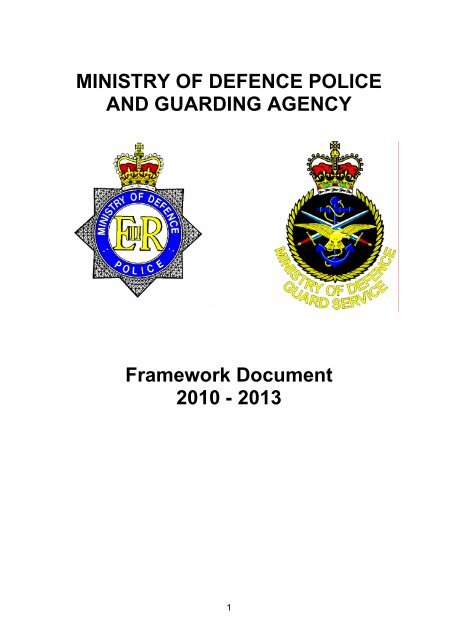
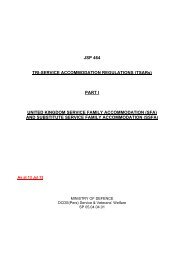
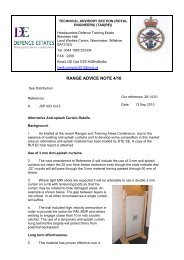

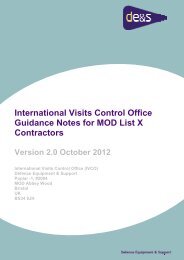
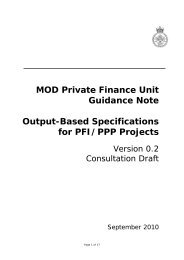
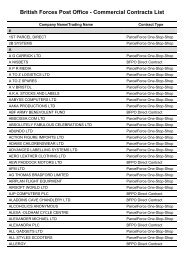
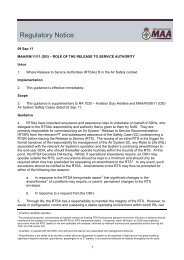
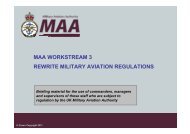
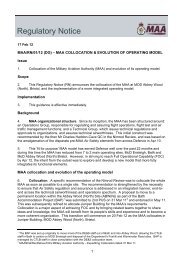
![MAA Regulatory Publications - FAQs PDF [37.3 KB]](https://img.yumpu.com/5906104/1/184x260/maa-regulatory-publications-faqs-pdf-373-kb.jpg?quality=85)
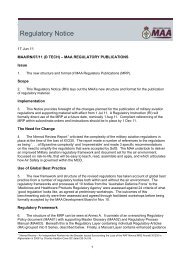
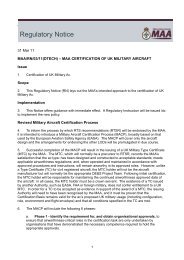
![3750 edition 6 PDF [263.5 KB] - Ministry of Defence](https://img.yumpu.com/5901071/1/184x260/3750-edition-6-pdf-2635-kb-ministry-of-defence.jpg?quality=85)
